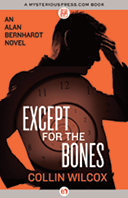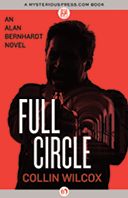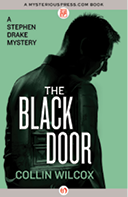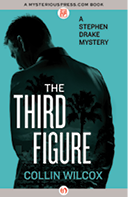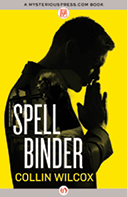The Third Figure (19 page)
Authors: Collin Wilcox
Tags: #Fiction, #Mystery & Detective, #Police Procedural
“Then what did you do?” I asked. There was something in his macabre ecstasy that I couldn’t endure—yet which was completely absorbing.
“I left,” he said. “I left and got in the car and drove back down the road. It was precisely eight o’clock, I remember, when I phoned the police.”
“And then you drove to school.”
He nodded.
“Then what?”
“Then I replaced the gun in the book—” He gestured toward the desk. “—and I got a good night’s sleep. No nightmares. Nothing whatever unusual. Except that, the next morning, I remember waking early—you know, like you do sometimes on special occasions. Christmas, or your birthday. I remember lying in bed and wondering whether I’d committed the perfect crime. I didn’t really think I had, of course. I wasn’t that naïve. But I knew I’d come close. And …” He looked at me with a kind of fond vexation. “And until now, of course, it
was
the perfect crime. It could still be, with luck.” He looked down at the gun and then glanced at his wristwatch. “I think I’ll wait until about twelve thirty,” he said. “Or maybe quarter to one.” For a moment he gazed at me with a dreamy, faraway look. “I’ll hate to do it, really. You seem like a gentle man, Mr. Drake. That may have been the reason I didn’t hit you with the pellet gun, Monday. Subconsciously, I might not have wanted to. …”
Glass shattered; wood splintered. Two uniformed policemen were threshing in the curtains like fish caught in a net.
Keystone cops
, I remember thinking.
Slapstick
. Carrigan stood in the doorway, gun in hand trained at the boy still sitting on the bed—still with his legs crossed. Carrigan’s voice was deep and calm; his eyes were steady.
“Drop it, Johnny. Right now. On the floor.”
The policemen were inside the room now. A ribbon of blood flecked one policeman’s hand. Splintered glass littered the floor. Their guns, too, were trained on the slight blond boy.
“Drop it,” Carrigan repeated, still in the same calm, deep voice. I was helpless in my chair, watching. I was shaking violently.
The gun in the boy’s hand was moving—deliberately raised up, away from his lap.
“Don’t be a damn fool.
Drop it
.”
But still the gun moved—steadily, inexorably. The muzzle was pointed toward the wall adjoining my chair. Now the muzzle was moving up toward the ceiling, describing a slow, sure arc.
“
Johnny. No. Please
.” It was my own voice.
The muzzle was now coming down toward the blond head.
“
Johnny. Don’t. You
…”
The shot was muffled. The gun slipped to the floor. The body was slack, falling upon the bed. The clear blue eyes were staring directly into mine. A bright thread of blood flowed slowly down the pale, twitching cheek.
I wrenched out of the chair, stumbled and fell against the wall. Clutching my stomach with both hands, I began to vomit.
“A
NOTHER ONE?” LARSEN HELD
the coffeepot poised over my empty cup.
“No, thanks.”
For the past several moments we’d been sitting silently. It had taken me almost twenty minutes to tell Larsen the whole story. Not once had he interrupted, either to comment or to question. Now, quietly, he said:
“It’s not your fault, you know. Someone would’ve found out. And he still would’ve killed himself.”
“No one can say that for sure. Besides, who would’ve found out?”
“Carrigan,” he answered promptly. “Carrigan is an easy guy to underestimate. But you can take my word for it: he’d’ve found out. After you phoned yesterday I did some checking, just out of curiosity. And I discovered that Carrigan had been assigned to the Vennezio murder. Very quietly. He was working completely alone, as I understand it, so as to protect himself from any kind of political pressure or local interference.”
“Maybe he’d’ve found out, maybe not. But no one’ll ever know whether the kid would’ve killed himself.”
“Do you think Mrs. Hanson knew the boy was guilty?” he asked, obviously to change the subject.
“I don’t know,” I answered. “I think she might’ve guessed.”
He nodded thoughtfully. Then, lightly bantering, he asked, “Did you get the rest of your money?”
“Not yet.”
“Did you ask for it?”
“I already told you: I just got back to the motel and packed my bag and left. No phone calls, nothing. I even forgot my toilet kit and my dirty laundry.”
“In other words, Russo didn’t know whether you’d left town or not.”
“I’m sure he knew. But I didn’t tell him.”
“What’re you going to do, send Aidia Vennezio a bill or something?”
“I suppose so.” Wryly I smiled. “I’ve still got time. It’s not the end of the month.”
Larsen smiled in return and poured himself a cup of coffee.
“Well,” he said finally, “I think you’re very, very lucky. Of all the conceivable combinations of all the people who might’ve killed him, for all the possible reasons, it couldn’t’ve worked out better for you. You might not even be sitting here right now if it had turned out to be Russo or Sabella or Mrs. Vennezio’s dwarf, not to mention Angelo. And, as far as that’s concerned, I don’t think anything but the boy’s suicide would’ve done you much good, either. I’m completely convinced that, once you discovered the murderer’s identity and told Russo, he’d’ve ordered you to get on the plane for San Francisco and not to tell a living soul.”
“I suppose you’re right.” I began gathering up my cigarettes and matches. I knew Larsen was anxious to get back to fiber-glassing his boat. And confirming the thought, Larsen rose to his feet with me, leaving his coffee half-finished.
“What I still can’t figure out,” he said as we walked out into the back yard, “is why Johnny would’ve volunteered all that information in the first place—about knowing who the murderer was, then refusing to identify him, yet still insisting he knew. It’s very strange. It was so contradictory that it was sure to arouse suspicion eventually.”
“I think it’s got something to do with the criminal’s urge to confess. I’ve heard you talk about that often—like in
Crime and Punishment
, which I understand psychologists still quote as a classic example.”
Thoughtfully Larsen nodded. “You could be right. Bravado—the so-called superman complex—is really just the other side of the urge to confess. Like leaving evidence, unconsciously. That happens all the time.”
“There’s something else, too, about Johnny’s so-called tip to me. He identified the murderer as his mother’s secret lover. Yet, thinking about it, I’m not completely sure that he knew Russo was even involved with his mother.”
“But Russo said that he’d seen Johnny out at the beach cabin.”
“Yes, but Johnny didn’t see Russo. And, what’s more, it wouldn’t proven anything if he had seen him. They were just two guys in two cars, parked beside the ocean.” I shook my head. “It doesn’t add up, that way. I think Johnny might’ve had a feeling that she had another lover, but I don’t think he was sure.”
“Well, obviously, he thought he’d divert suspicion from himself if he named another suspect.”
“Maybe so,” I replied doubtfully. “But you said it yourself: coming out with it like he did, so strangely, he’d’ve been better off to’ve kept quiet.”
“How do you figure it, then?”
“I figure,” I said slowly, “that, again, it was a kind of an unconscious confession. He was naming his mother’s secret lover as the murderer—which was, in fact, the unconscious truth. He was naming himself.”
Larsen sighed. “The faithful old Oedipus complex. I’ll be glad when it goes out of style. The way it is now, everything’s so predictable. Besides, I thought you said the kid was queer.”
“That was just an impression. He was screwed up, obviously. And, as far as that goes, Oedipus and homosexuality are supposed to be pretty close.”
Larsen nodded. Obviously, he was losing interest in the conversation. “I wonder,” he said musingly, “how things’ll work out with Russo and Sabella.”
“I figure Sabella’ll get transferred to the Des Moines office. At least.”
Larsen smiled, and we stood in silence for a moment.
“You want any help fiber-glassing?” I asked.
“No, thanks.” He smiled and clapped me lightly on the shoulder. “Besides, you need a vacation. If I were you, I’d take off for a long weekend. Go down to Carmel or somewhere.”
“If I could find someplace where I didn’t have to stay in a motel,” I replied, “maybe I would.”
“I see what you mean.” Again he smiled, said good-bye and turned toward the garage.
I got into my car and drove slowly away, aimlessly. I switched on the radio and found some loud rock music, but the noise didn’t help. I couldn’t forget the bright ribbon of blood trickling down the pale, twitching cheek—and the eyes that seemed still alive, staring into mine.
All rights reserved, including without limitation the right to reproduce this ebook or any portion thereof in any form or by any means, whether electronic or mechanical, now known or hereinafter invented, without the express written permission of the publisher.
This is a work of fiction. Names, characters, places, events, and incidents either are the product of the author’s imagination or are used fictitiously. Any resemblance to actual persons, living or dead, businesses, companies, events, or locales is entirely coincidental.
Copyright © 1968 by Collin Wilcox
Cover design by Michel Vrana
978-1-4804-4654-0
This 2013 edition distributed by MysteriousPress.com/Open Road Integrated Media
345 Hudson Street
New York, NY 10014




